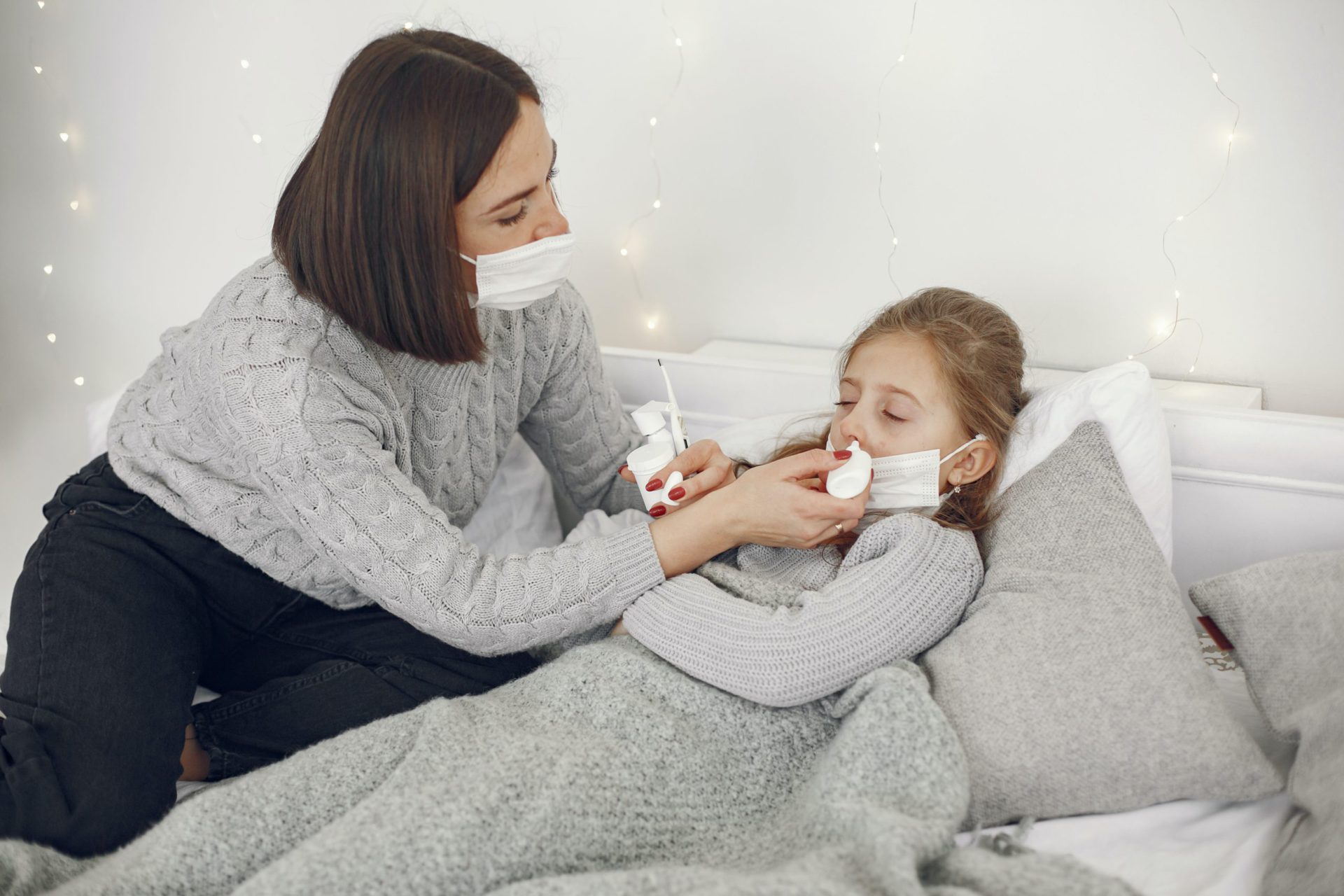 Sinus infections are a common ailment that affects millions of people every year. While most cases are not severe and can be treated with over-the-counter medications, it is important to understand how sinus infections are spread and what factors affect contagion. In this article, we will explore the different ways sinus infections can be transmitted, including through airborne and contact transmission. We will also examine the factors that affect contagion, such as duration of infection and personal hygiene. Finally, we will provide some tips on how to prevent the spread of sinus infections to keep yourself and those around you healthy.
Sinus infections are a common ailment that affects millions of people every year. While most cases are not severe and can be treated with over-the-counter medications, it is important to understand how sinus infections are spread and what factors affect contagion. In this article, we will explore the different ways sinus infections can be transmitted, including through airborne and contact transmission. We will also examine the factors that affect contagion, such as duration of infection and personal hygiene. Finally, we will provide some tips on how to prevent the spread of sinus infections to keep yourself and those around you healthy.
The Basics of Sinus Infections: What They Are and How They Develop
Sinus infections occur when the tissues lining the sinuses become inflamed or infected, leading to mucus buildup. There are two main types: acute (lasting up to four weeks) and chronic (lasting over 12 weeks). Symptoms include facial pain or pressure, headache, congestion, and loss of smell or taste. To diagnose, a doctor may perform a physical exam and imaging tests. Treatment involves managing symptoms with medications, such as decongestants or antibiotics, and in severe cases, surgery.The Contagion Factor: Understanding How Sinus Infections Spread
Sinus infections can be spread through airborne and contact transmission. Airborne transmission occurs when an infected person sneezes, coughs, or talks, releasing respiratory droplets into the air that can be inhaled by others. Contact transmission occurs when a person touches a surface contaminated with the virus or bacteria that causes sinus infections, then touches their nose or mouth. Several factors affect the contagion of sinus infections. The first is the duration of the infection, as people are most contagious during the first few days of illness. The second is personal hygiene, as people who practice good hand hygiene and cover their mouths when they cough or sneeze are less likely to spread infection. The third is the number of people in close proximity, as crowded or poorly ventilated environments can increase the risk of transmission. To prevent the spread of sinus infections, it is important to practice good respiratory and hand hygiene. This includes covering your mouth when coughing or sneezing, washing your hands regularly with soap and water, and avoiding close contact with people who are sick. It’s also important to stay home if you’re feeling ill to avoid spreading infection to others. If you have sinusitis symptoms, be sure to consult with a healthcare professional to get a proper diagnosis and treatment plan, and to avoid spreading the infection to others.Airborne Transmission: How Sneezing and Coughing Can Spread Sinus Infections
Airborne transmission is one of the main ways that sinus infections can spread. When an infected person sneezes or coughs, they release respiratory droplets into the air, which can contain the virus or bacteria that causes sinus infections. These droplets can then be inhaled by others, potentially leading to infection. The size and trajectory of respiratory droplets can vary depending on the person and the circumstances. Larger droplets tend to travel a shorter distance before falling to the ground, while smaller droplets can remain suspended in the air for longer periods of time and can travel farther. Factors such as the force of the sneeze or cough, the angle of the person’s head, and the ventilation in the room can also affect the spread of droplets. To reduce the risk of airborne transmission, it is important to practice good respiratory hygiene. This includes covering your mouth and nose when coughing or sneezing, using a tissue or the inside of your elbow instead of your hands, and disposing of used tissues properly. If you are in close proximity to someone who is sneezing or coughing, it’s also a good idea to wear a mask to protect yourself from inhaling droplets. Overall, understanding how sinus infections can be spread through airborne transmission is crucial to preventing the spread of infection and protecting yourself and others. By practicing good respiratory hygiene and being aware of the risk factors, you can help reduce the spread of sinus infections.Contact Transmission: How Direct and Indirect Contact Can Spread Sinus Infections
What is Contact Transmission?
Contact transmission is the spread of infectious agents through physical contact with an infected person or a contaminated surface.Direct Contact Transmission
Direct contact transmission occurs when an infected person comes into physical contact with another person, transferring the virus or bacteria directly. This can occur through activities such as kissing, sharing utensils, or touching an infected person’s face.Indirect Contact Transmission
Indirect contact transmission occurs when a person touches a surface that is contaminated with the virus or bacteria that causes sinus infections. This can occur in public places like doorknobs, countertops, or railings, or even personal items like phones and keyboards.How to Prevent Contact Transmission
To reduce the risk of contact transmission, it is important to practice good hand hygiene by washing your hands frequently with soap and water or using an alcohol-based hand sanitizer. Avoid touching your face, especially your eyes, nose, and mouth, and clean and disinfect frequently touched surfaces regularly.Other Ways Contact Transmission Can Occur
Contact transmission can also occur through sharing personal items like towels or grooming supplies, or through contact with bodily fluids like saliva or mucus. It’s important to avoid sharing personal items and to dispose of tissues properly to prevent the spread of infection.
People at Higher Risk of Spreading and Contracting Sinus Infections
Certain lifestyle factors, occupations, and medical conditions can increase the risk of both spreading and contracting sinus infections. In this section, we’ll explore who is at a higher risk and how to prevent the spread and contraction of sinus infections.People at Higher Risk of Spreading Sinus Infections
Some people are at a higher risk of spreading sinus infections due to their lifestyle, occupation, or medical conditions. These include:- Healthcare workers: They are at a higher risk due to frequent exposure to sick patients.
- Teachers: They work in close proximity with children who may have sinus infections.
- People who smoke: Smoking irritates the sinuses and weakens the immune system, making it easier to contract and spread infections.
- People with weakened immune systems: Their immune system is less able to fight off infections, making them more susceptible to contracting and spreading sinus infections.
People at Higher Risk of Contracting Sinus Infections
Some people are at a higher risk of contracting sinus infections due to their lifestyle, occupation, or medical conditions. These include:- People with allergies: Allergies can cause inflammation in the sinuses, making it easier for infections to take hold.
- People with asthma: Asthma can also cause inflammation in the sinuses, making it easier for infections to occur.
- People with weakened immune systems: Their immune system is less able to fight off infections, making them more susceptible to contracting sinus infections.
- People with structural issues in their sinuses: Structural issues such as deviated septum or nasal polyps can cause blockages in the sinuses, leading to infections.
Preventing the Spread and Contracting of Sinus Infections
To prevent the spread and contracting of sinus infections, it is important to practice good hygiene, such as washing your hands frequently, covering your mouth and nose when coughing or sneezing, and avoiding close contact with sick individuals. Additionally, it is important to manage underlying medical conditions, such as allergies or asthma, and to seek medical treatment if you suspect a sinus infection.Duration of Contagion: How Long Can Sinus Infections Be Spread?
How Long Can Sinus Infections Be Spread? Sinus infections are contagious, but the duration of contagion can vary depending on the cause of the infection and individual factors. Here are some factors to consider:
Type of Infection and Treatment The duration of contagion can depend on the type of infection and the treatment used to manage it. For example, bacterial sinus infections may require antibiotics, which can reduce the duration of contagion. On the other hand, viral sinus infections may not respond to antibiotics and can last longer.
Symptoms Indicators such as coughing, sneezing, and congestion can increase the risk of spreading the infection to others. It is important to practice good hygiene and avoid close contact with others until symptoms have resolved.
Individual Factors Individual factors such as age, overall health, and immune system function can also affect the duration of contagion. Children, older adults, and people with weakened immune systems may be contagious for longer periods of time.
Preventing the Spread of Sinus Infections To prevent the spread of sinus infections, it is important to practice good hygiene, such as washing your hands frequently, covering your mouth and nose when coughing or sneezing, and avoiding close contact with sick individuals. Additionally, it is important to manage underlying medical conditions and to seek medical treatment if you suspect a sinus infection.


The Importance of Hygiene: Preventing the Spread of Sinus Infections
Practicing good hygiene is an important way to prevent the spread of sinus infections. Here are some tips to help you stay healthy and prevent the spread of infection.Handwashing
Frequent handwashing is one of the most effective ways to prevent the spread of infection. Make sure to use soap and warm water, and wash your hands for at least 20 seconds.Avoid Touching Your Face
Your hands can pick up germs from surfaces, and touching your face can transfer those germs to your nose, mouth, and eyes. Avoid touching your face, and use a tissue or your elbow to cover your mouth and nose when coughing or sneezing.Disinfect Surfaces
Sinus infection-causing germs can live on surfaces for several hours or even days. Disinfect surfaces regularly, especially those that are frequently touched, such as doorknobs, light switches, and countertops.Stay Home When You’re Sick
If you have a sinus infection, it’s important to stay home until your symptoms have resolved. This can help prevent the spread of infection to others.Covering the Nose and Mouth: A Simple Way to Reduce Contagion
Covering your nose and mouth when you cough or sneeze is a simple yet effective way to reduce the spread of sinus infections. When you cough or sneeze, droplets from your nose and mouth are expelled into the air, and these droplets can contain the germs that cause sinus infections. By covering your nose and mouth, you can help prevent those droplets from spreading to other people or surfaces.
The best way to cover your nose and mouth is to use a tissue or the crook of your elbow. If you use a tissue, make sure to throw it away immediately after use and wash your hands thoroughly. If you use your elbow, make sure to wash your clothing afterward to prevent the spread of germs.
By covering your nose and mouth when you cough or sneeze, you can help reduce the spread of sinus infections and protect others from infection. It’s a simple yet effective way to promote good hygiene and prevent the spread of illness.
Common Myths About Sinus Infection Contagion and the Truth Behind Them
There are many myths surrounding sinus infection contagion. Here are some of the most common myths and the truth behind them:
- Myth: Sinus infections are only contagious when symptoms are present.
- Myth: Sinus infections can only be spread through direct contact with an infected person.
- Myth: Hand sanitizer is just as effective as washing your hands in preventing sinus infection transmission.
- Myth: Sinus infections cannot be spread through the air.
- Myth: You can only get a sinus infection once, and then you’re immune.







